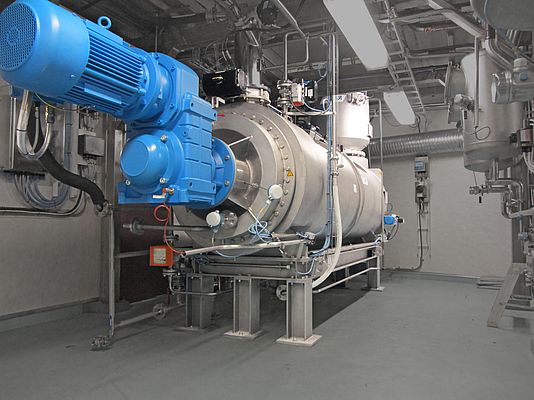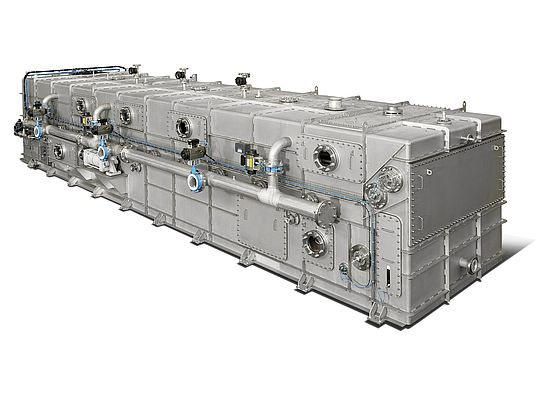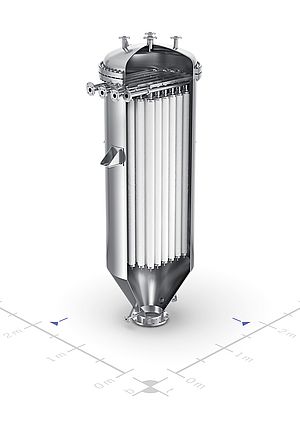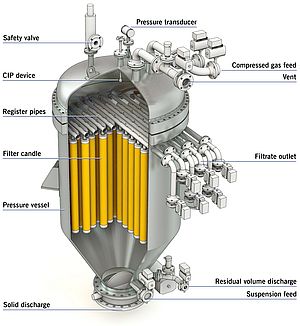Egg yolk is an excellent source of phospholipids. In order to extract these lipids, the user suspends egg yolk powder in ethanol. This suspension is filtered and washed several times. The phospholipids thus obtained are used, for instance, as an emulsifier in the chemical industry or in baby food. The filter cake from the filtration can be further processed into animal feed.
Previously, the egg yolk powder was resuspended in a series of containers and washed out by means of dilution washing. The user replaced this complex batch process with a continuous process. BHS-Sonthofen analyzed the existing processes and tested alternatives in the laboratory. Ultimately, BHS recommended the use of a belt filter as the most suitable solution.
BF belt filter from BHS increases yield of phospholipids
The indexing belt filter used is a continuously operating, horizontal vacuum filter that makes it possible to separate sedimentation solids gently and reliably. An indexing belt filter of type BF 050-045 B operated with a vacuum pump was installed at the user’s premises. The suspension of egg yolk powder and ethanol is continuously fed into the filtration system. The filter medium is a circulating belt that is indexed. The filtrate is drained at each stage individually. As the extraction of phospholipids is a relative fast process, even short active time allows for high yields. By using a multi-stage parallel cake wash system in the filter, a highly efficient positive displacement wash can be realized.
At this stage, the phospholipids are present in the filtrate. “The continuous process increased the yield of phospholipids by several percent,” notes Detlef Steidl, Senior Director of Sales Filtration Technology at BHS-Sonthofen. It also boosted the efficiency of the washing process: The supplied filter is equipped with three nozzle wash systems on the filter. “Compared to the previous process using several containers, washing the filtrate in the belt filter requires significantly less solvent and energy,” Steidl adds. The customer is completely satisfied with the filter’s performance, and the system has also been validated for the production of pharmaceutical substances.
HTK-T continuous dryer dries egg yolk powder to a residual moisture of 10 percent
The user dries the filter cake to egg yolk powder with a residual moisture content of ten percent after filtration. AVA developed a suitable continuous drying process and supplied the required 1,700-liter HTK-T continuous dryer. The egg yolk powder that has a moisture content of 60 to 65 percent is conveyed from the belt filter to the dryer. Optimized transfer moisture in the integrated filtration and drying system enables maximum efficiency regarding energy consumption, process time and machine size. The dryer delivers a throughput capacity of 485 kg/h.
The filter cake is placed in direct contact with the shaft and the double jacket of the horizontal dryer. Both the shaft and the double jacket are heated with steam. The double jacket is divided into two heating zones in order to ensure gentle heating of the product. The target temperature is between 70 and 80 degrees. A vapor filter passes the evaporated ethanol on to the condensation system. There, the ethanol is collected so it can be used again in the process.
“The rotating mixer continuously feeds the egg yolk powder through the dryer, so it is discharged with less residual moisture than the 10 percent required by the customer,” explains Martin Specht, Sales Manager at AVA . “The blades are arranged in such a way that homogeneous mixing takes place and no dead pockets are created.” The dried product is finally discharged into a shaft via a manually adjustable weir. There the powder is crushed and then pneumatically conveyed to a double cooling screw, where it is cooled down to 25 degrees. The final product is then filled into bulk containers for further processing before it is sold as a nutrient-rich basic component for the animal feed industry.





















